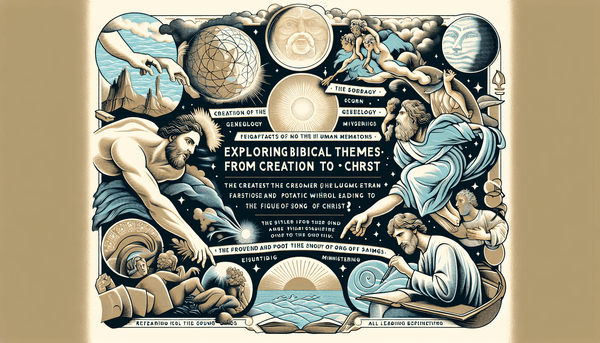Genealogy and Birth of Jesus (Matthew 1)
The first chapter of Matthew serves as a profound opening to the New Testament, presenting not only the genealogy of Jesus Christ but also the divine announcement of His birth. Tracing the lineage from Abraham through King David, the text establishes Jesus' rightful place in Jewish history and fulfills longstanding prophecies. As noted in Matthew 1:1, 'The book of the genealogy of Jesus Christ, the son of David, the son of Abraham.' This genealogical record underscores the fulfillment of God's promises. Moreover, the angel's visitation to Joseph, as described in Matthew 1:21, reveals the miraculous conception of Jesus, 'She will bear a son, and you shall call his name Jesus, for he will save his people from their sins.' This narrative not only fulfills Isaiah's prophecy, 'Therefore the Lord himself will give you a sign. Behold, the virgin shall conceive and bear a son, and shall call his name Immanuel' (Isaiah 7:14), but also resonates with the promise in Jeremiah 23:5, of a righteous Branch from David's line who would bring justice and righteousness.
The Creation Narrative (Genesis 1)
In the opening chapter of Genesis, we encounter the majestic account of creation, where God brings the universe into existence. The narrative unfolds over six days, with God systematically creating the heavens, the earth, and all living things. Each act of creation is met with God's affirmation that it was 'good,' a testament to the inherent value and beauty of His work. Genesis 1:1 sets the stage: 'In the beginning, God created the heavens and the earth.' The crescendo of this creation account is the formation of humanity. Unique among all creation, man and woman are made in God's image, as stated in Genesis 1:26. The chapter culminates with God's evaluation in Genesis 1:31, 'And God saw everything that he had made, and behold, it was very good.' This foundational narrative not only explains the material origins of the world but also establishes the divine-human relationship and the intrinsic goodness infused in creation.
Understanding Scorn and Disdain
Scorn and disdain, as portrayed in the Bible, are attitudes that believers are cautioned against. The scriptures make it clear that expressing contempt or disdain towards others is not in line with a godly character. Proverbs 3:34 warns, 'He mocks proud mockers but shows favor to the humble and oppressed,' highlighting the divine preference for humility over pride. This sentiment is echoed in Proverbs 18:12, which reminds us that 'Before a downfall the heart is haughty, but humility comes before honor.' The Bible consistently promotes humility and kindness, as opposed to scorn, which often leads to ridicule and mockery. Jesus himself exemplified this in His life and teachings, as seen in Matthew 23:12, 'Whoever exalts himself will be humbled, and whoever humbles himself will be exalted.' These verses collectively serve as a reminder of the perils of pride and the virtues of a humble spirit.
The Act of Ministering
The concept of ministering is woven throughout the fabric of the Bible, with Jesus Christ as the epitome of a servant leader. Ministering encompasses a range of services one can offer, from teaching and preaching to caring for the needy. It is an expression of love and commitment to others, as exemplified by Christ who 'came not to be served but to serve, and to give his life as a ransom for many' (Matthew 20:28). Ministering is a calling for every believer, a way to demonstrate the love of God through practical actions. Galatians 5:13 encourages us, 'For you were called to freedom, brothers. Only do not use your freedom as an opportunity for the flesh, but through love serve one another.' The apostle Peter also emphasizes this point, 'As each has received a gift, use it to serve one another, as good stewards of God's varied grace' (1 Peter 4:10). By following Jesus' example of service, believers are called to embrace a life of ministering to others.
Conclusion
In our journey through these diverse biblical themes, we have seen the unfolding of God's grand narrative—from the very act of creation to the intricate details of Jesus' lineage, and from the deep-seated issues of human pride to the call for humble service and the poetic celebration of love. Each topic not only enriches our understanding of the Bible but also offers practical wisdom for living a life that reflects God's character and purposes. May the insights from these passages inspire us to continue seeking knowledge, living with humility, serving with love, and embracing the fullness of life as intended by our Creator.






